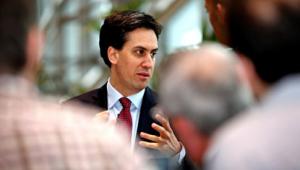By Richard Johnstone | 29 November 2012
Business leaders have urged Chancellor George Osborne to use next week’s Autumn Statement to speed up plans for a state-backed business bank.
 In a submission for the December 5 statement, issued today, the CBI business group said Osborne should capitalise on the ‘emerging consensus’ that a government business bank would improve lending.
In a submission for the December 5 statement, issued today, the CBI business group said Osborne should capitalise on the ‘emerging consensus’ that a government business bank would improve lending. Director general John Cridland said it would ‘ease the transition to a new normal of business lending’.
Business Secretary Vince Cable announced the plan for the bank in September, which would support ‘manufacturers, exporters and high-growth companies’. He announced that the government would provide it with £1bn of start-up funding, but did not say when it would be created.
Cridland said Osborne should set out proposals for it to be ‘up and running as soon as possible’, adding that there were two ways the bank could increase financial support to businesses.
The first would be by establishing a one-stop-shop to improve the take-up of existing government support, such as UK Export Finance and the Regional Growth Fund. Secondly, the bank could ‘plug the finance gap for growing medium-sized businesses by providing a wholesale funding solution to deliver long-term “patient capital”’.
The CBI also urged Osborne to ‘stick to the course on deficit reduction’, but called for further action to boost growth. In addition to founding the new bank, the government should make £1.5bn from the sale of the 4G mobile licences available for ‘short-term, high-impact’ public spending. This funding could provide a temporary boost to local authorities’ spending on road maintenance, and also cap next year’s increase in business rates to 2%.
‘The CBI fully supports the government’s deficit reduction plan,’ Cridland said. ‘This is critical for the UK to keep the confidence of international markets. However, the government does have additional resources available – it underspent by £7.8bn last year and will receive a windfall of up to £4bn from the 4G spectrum auction next year.’
Cridland also said Osborne should resist calls to reduce tax relief on pension contributions.
Earlier this week, the Centre for Policy Studies said the relief should be scrapped on contributions for higher rate taxpayers, arguing it was part of a ‘largely failed attempt to encourage retirement savings’.
The think-tank’s Costly and ineffective: why pensions tax relief should be reformed said ending relief for those paying in the 40p tax band would raise £7bn in taxation annually.
However, Cridland said ending the relief would be ‘an income tax which would hit swathes of middle-income earners’.
He added: ‘Reducing the tax-free limit would fly in the face of the government’s efforts to encourage more people to save adequately for their retirement, and its drive to position the UK as a world-leading business investment location.’
However, the Institute for Public Policy Research said today that restricting higher rate pension tax relief ‘would be fair’ if Osborne had to announce new tax rises to meet his fiscal rules.
Director Nick Pearce said that a ‘sweeping’ overall restriction of pension relief was unlikely.
Instead, the chancellor could reduce the annual or lifetime allowances, he said. If individual’s income tax relief on pensions was capped at £1m for a lifetime, this could raise around £1.5bn each year.





















